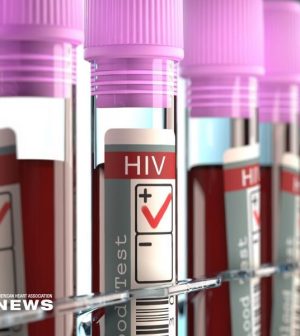- Could Your Grocery Store Meat Be Causing Recurring UTIs?
- Are You Making This Expensive Thermostat Error This Winter?
- Recognizing the Signs of Hypothyroidism
- 10 Strategies to Overcome Insomnia
- Could Artificial Sweeteners Be Aging the Brain Faster?
- Techniques for Soothing Your Nervous System
- Does the Water in Your House Smell Funny? Here’s Why
- Can a Daily Dose of Apple Cider Vinegar Actually Aid Weight Loss?
- 6 Health Beverages That Can Actually Spike Your Blood Sugar
- Treatment Options for Social Anxiety Disorder
Twice-a-Year Injection Gives Women Full Protection Against HIV, Trial Finds

Just two injections a year of a new HIV drug protected young women in Africa from infection with the sexually transmitted disease, new trial results show.
In announcing the findings, Gilead Sciences Inc. said its HIV medication lenacapavir demonstrated 100% efficacy as a preventive treatment.
This is the first round of data generated from Gilead’s PURPOSE program, a collection of five HIV prevention trials that are being conducted around the world, the company noted.
“With zero infections and 100% efficacy, twice-yearly lenacapavir has demonstrated its potential as an important new tool to help prevent HIV infections,” Gilead Chief Medical Officer Dr. Merdad Parsey, said in a news release announcing the results. “We look forward to additional results from the ongoing PURPOSE clinical program and continuing toward our goal of helping to end the HIV epidemic for everyone, everywhere.”
The randomized controlled trial of lenacapavir, conducted in Uganda and South Africa, tested whether two injections of lenacapavir a year would provide better protection against HIV infection than two other daily pills widely used in high-income countries.
The results with lenacapavir were so convincing the trial was halted early after an independent data review committee said all participants should be offered the injection because it clearly provided superior protection against the virus, Gilead said.
None of the 2,134 women who received lenacapavir contracted HIV, while 16 of the 1,068 women who took Truvada, a daily pill that has been available for more than a decade, and 39 of 2,136 women who got a newer daily pill called Descovy were infected.
“For a young woman who can’t get to an appointment at a clinic in a town, a young woman who can’t keep pills without facing stigma or violence — an injection just twice a year is the option that could keep her free of HIV,” Lillian Mworeko, who leads a group called the International Community of Women Living With HIV Eastern Africa, told the Times.
Still, the Gilead data has not yet been published in a peer-reviewed journal. A second trial, conducted in six other countries, is testing lenacapavir in men who have sex with men, in transgender people and in those who use injection drugs, the company said. Midterm review of those results will take place later this year.
While Truvada has been widely used by gay men in the United States and other high-income countries for years, it has not been as effective in Africa, where use has been low, particularly among vulnerable young African women, the Times reported.
The hope is that a twice-a-year injection, which is far more convenient than taking daily pills, will prove to be a more powerful prevention tool in that country.
The remaining question is access: Gilead charges $42,250 per patient per year for lenacapavir in the United States, the Times reported.
However, Gilead has committed to quickly making large volumes of the drug available at “at prices that enable widespread availability” in low-income countries with high HIV incidence rates.
More information
The National Institutes of Health has more on HIV drugs.
SOURCES: Gilead Sciences Inc., news release, June 20, 2024; New York Times
Source: HealthDay
Copyright © 2026 HealthDay. All rights reserved.










